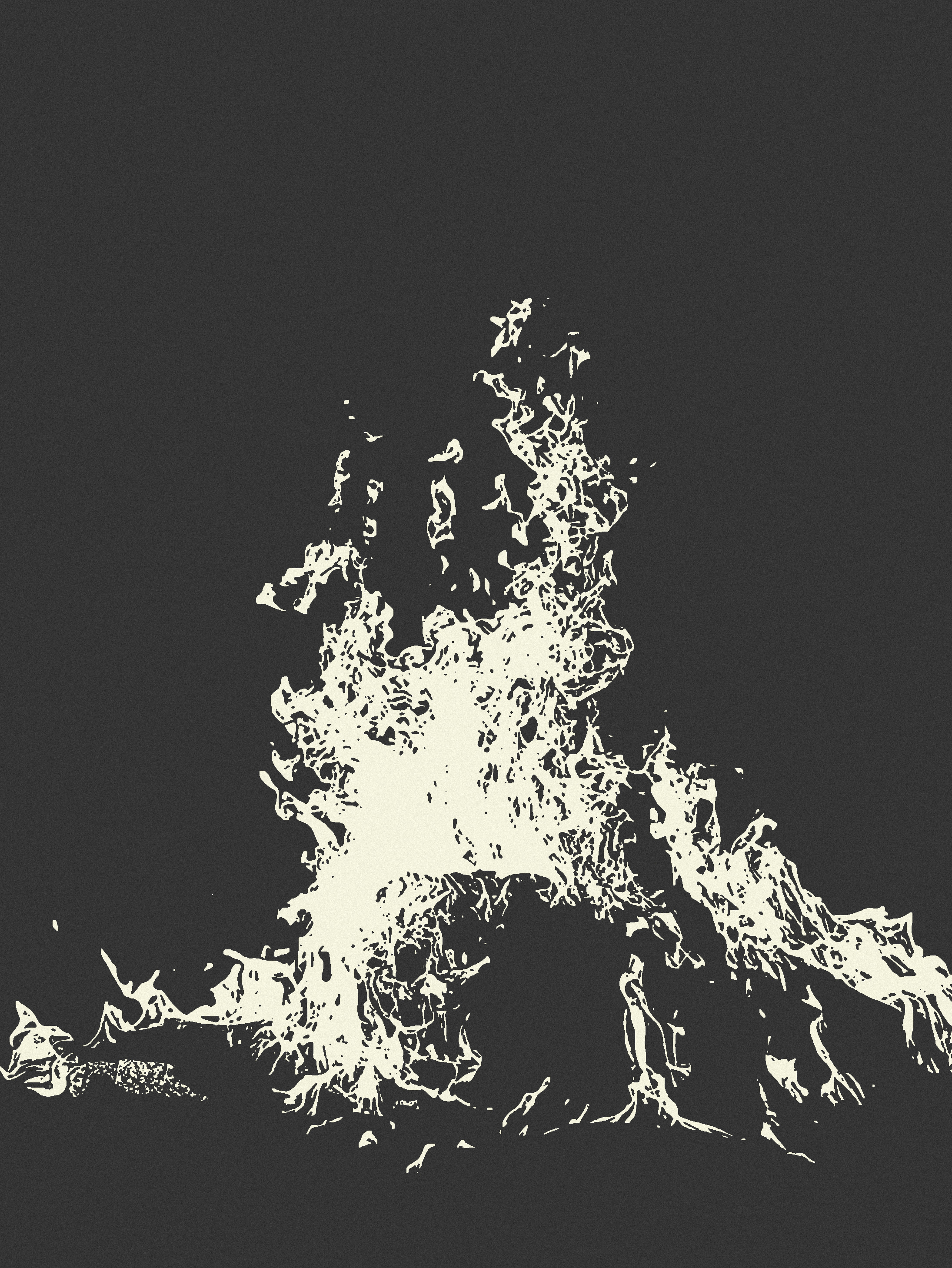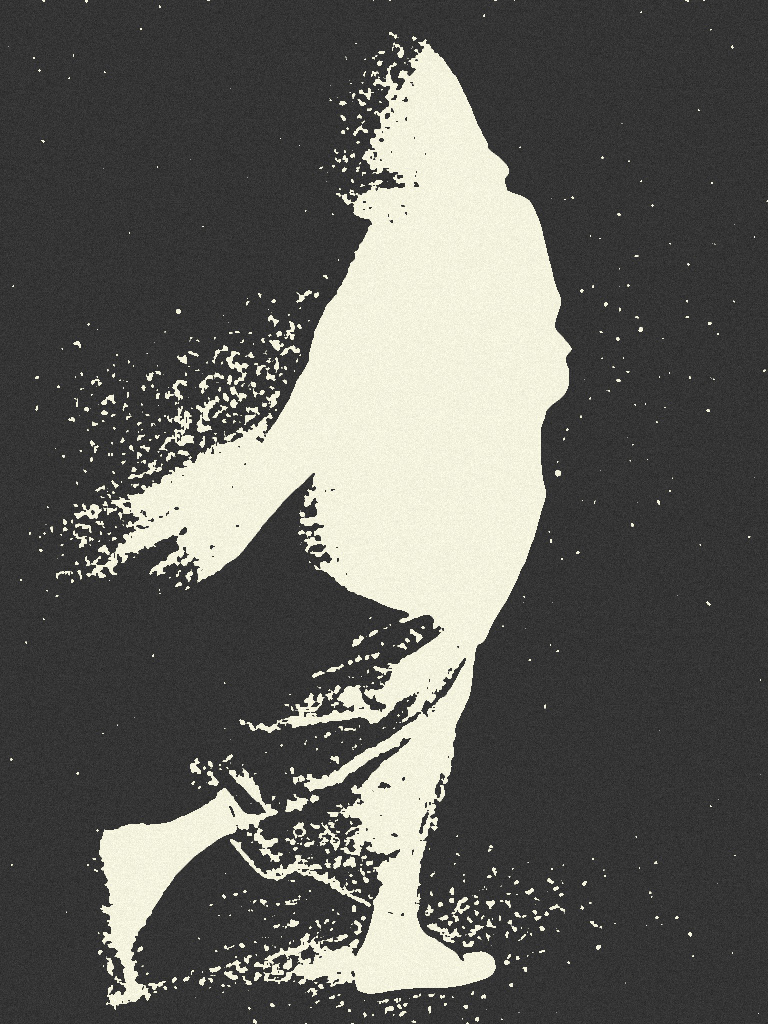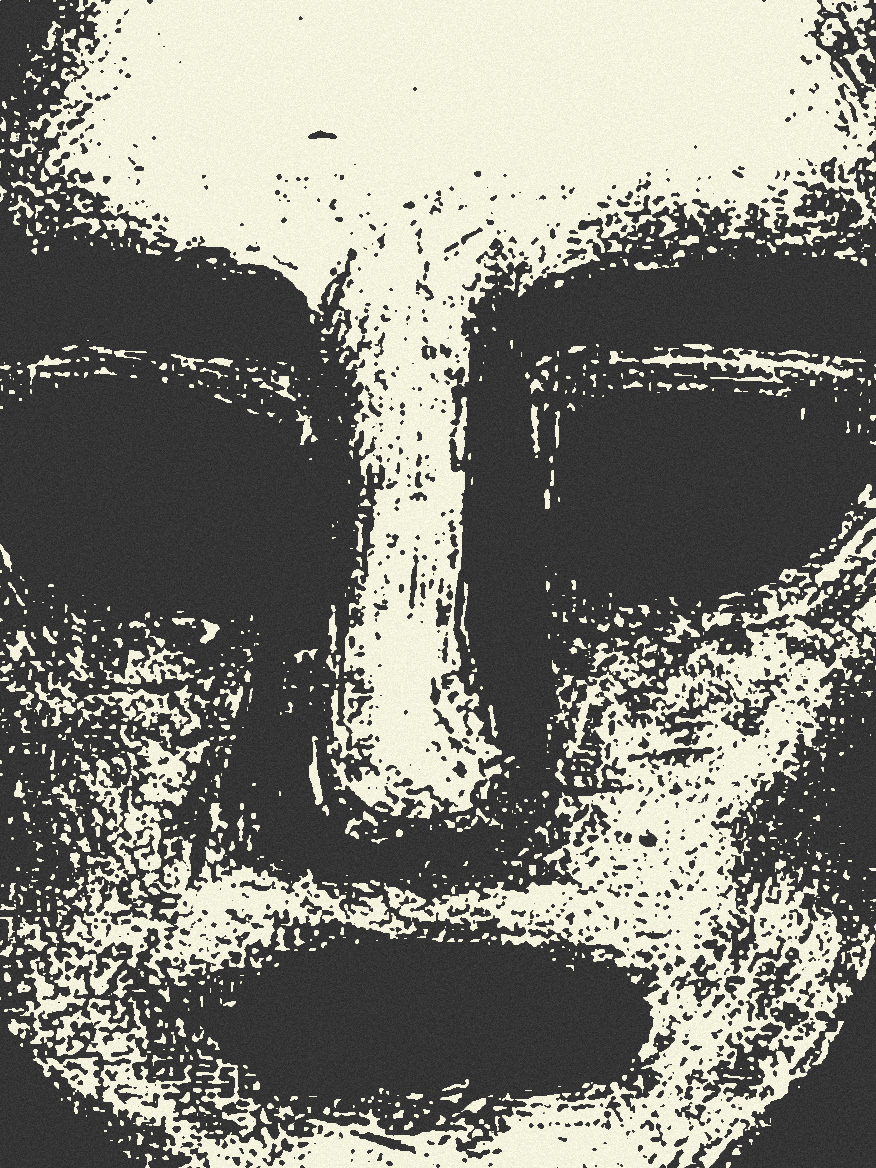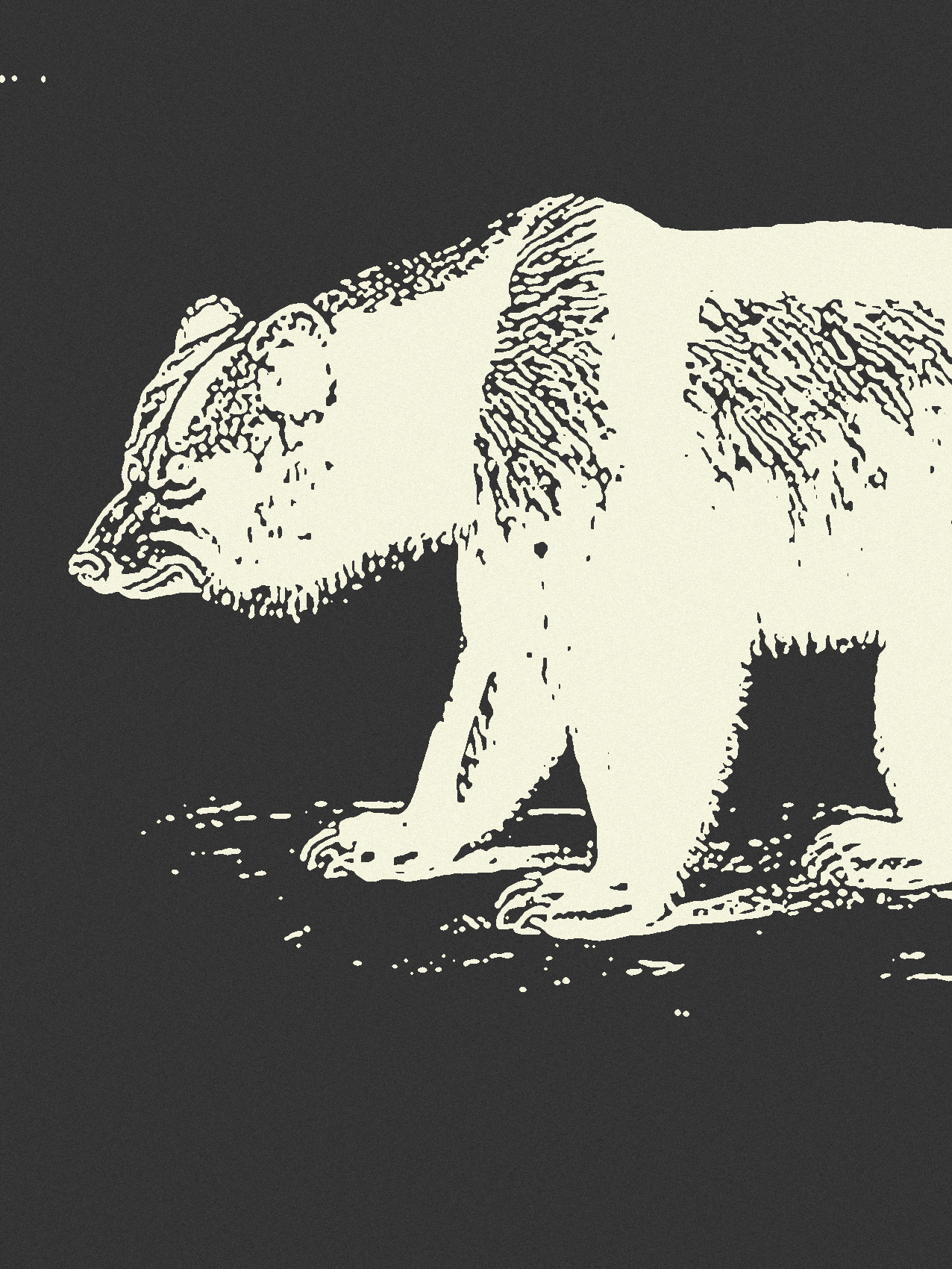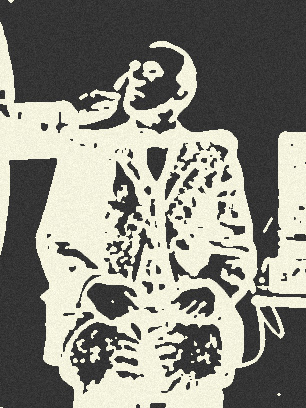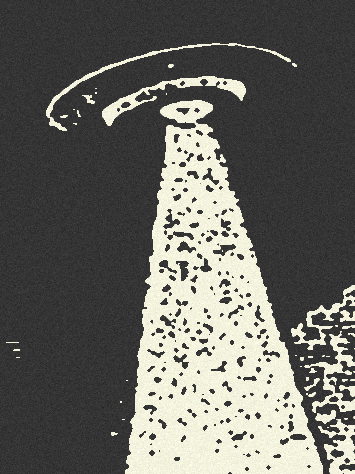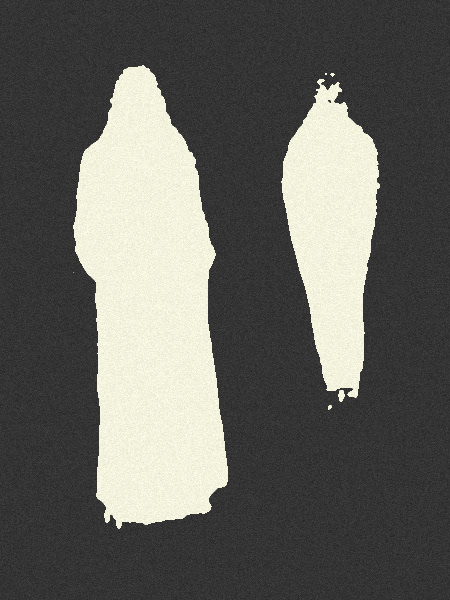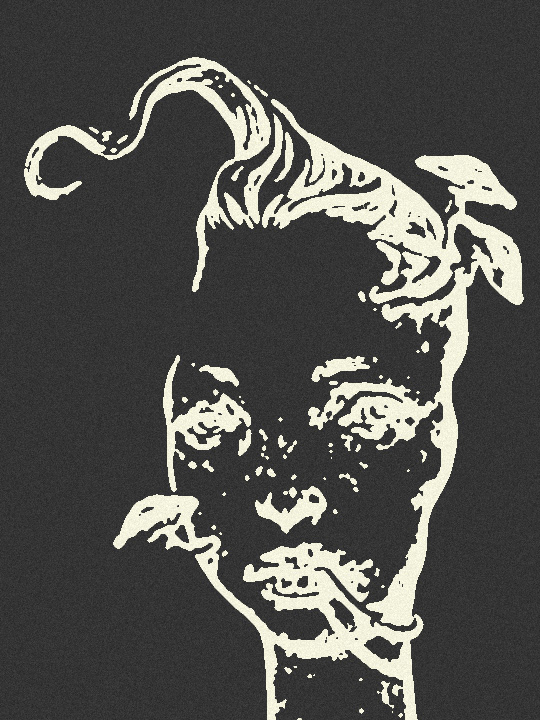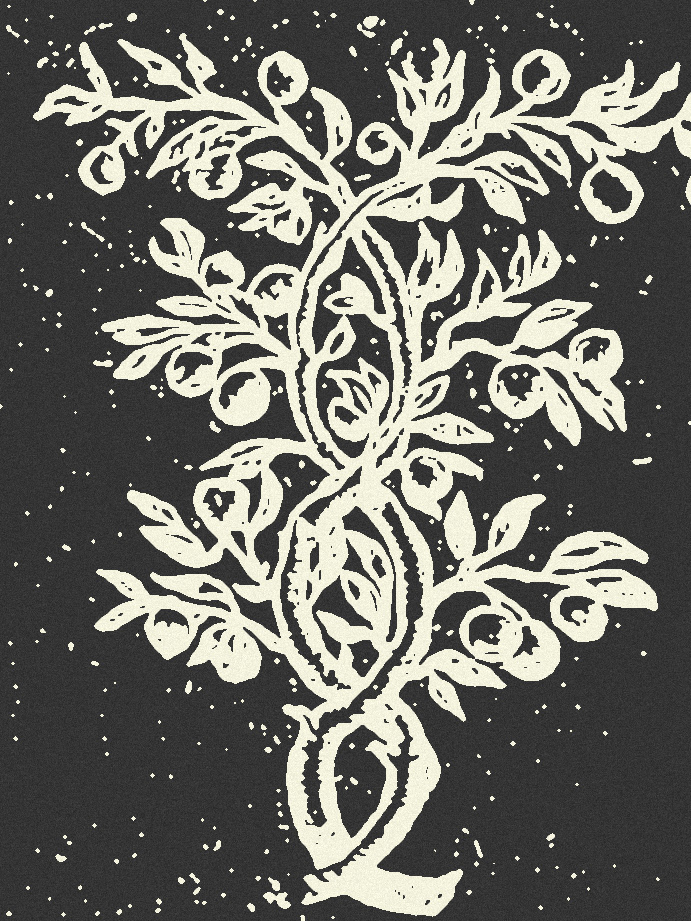✷
I
My father took me to the summit of the mountain where we could see the titan hanging from a cliff. His arms were outstretched and fastened to the rock with rusted spikes nailed through his wrists. His feet were bound with chains. And his head hung to the side, eyes downcast, skin sunburnt, face as craggy as the bark of an old juniper tree.
“Should we be doing this?” I asked. “What if he catches us staring at him?”
“He’s been trapped there as long as anyone can remember,” my father said, climbing off his horse. He stroked his beard—a grand old thing that was once as black as coal but had recently begun to turn gray. He lumbered over to the ledge of the landing. “He’s been paying his penance since humanity’s first thought was spoken.”
“I don’t like it here,” I said, still clutching the reins of my horse—a skinny mare who seemed to feel as nervous about this situation as I did. “It feels like we’re trespassing.”
“Trespassing,” my father laughed with more than a tinge of sarcasm. “Since when have you been afraid of trespassing?”
I didn’t respond. I felt a lump start to form in my stomach.
My father turned toward me. His eyes stern and body rigid. He was doing his best to contain his rage.
“You need to see how the gods can punish one of their own—and then imagine how they might punish someone as insignificant as you.”
II
Cassandra and I lived in adjoining houses on a bluff overlooking the ocean. During the summers—which could be so insufferably hot that it felt like the whole earth was about to burst into flames—we would run down to the beach to play in the water.
How I loved to watch Cassandra swim beside me. Her hair shimmering like golden waves in the sun and her skin turning a deeper shade of brown with each passing day.
We had been doing this since we were little children who loved to weave grand stories about the mundane wonders we discovered under the pristine waters along the shore and in the caves at the end of the beach. We conjured up tales of gods, pirates, and magicians—our imaginations always blending so harmoniously together that it felt as if the stories we told were always meant to be.
We even concocted a miraculous story about ourselves. We told anyone who would listen that we had been born together out of the foam of a mighty wave that crashed against the shore one morning while our mothers were taking a walk on the beach together to discuss growing their families. To their surprise, they found us mewling together in a tide pool. Thanking the gods for plucking us from their dreams and making us real, each took the child they favored most and raised us with such care and passion that nobody would’ve ever known that we were not their own.
Those mornings now seem like little eternities in my memory. We spent endless hours conjuring up our tales. One of our favorites involved Odysseus and the island of the sirens. I'd play the inventive warrior, trying to make his way back home to his wife, Penelope. And Cassandra would play a siren trying to lure me off my path with her enchanting song. We would imagine what would have happened if Odysseus had not heeded Circe’s warnings and tied himself the mast of his ship when he and his crew sailed by the siren’s island. Their song would lure him to the island, and he would discover that it was inhabited by creatures as hideous and cruel as their songs were beautiful.
I enjoyed playing Odysseus. He was a clever hero. He knew ingenious ways to escape his captors—like fastening seashells to his ears to break the spell of the sirens’ song and escape the island. By embodying him, I came to believe that I could be clever as well. But I didn’t want to be a warrior or adventurer. I wanted to be an inventor like the god Hephaestus. Nothing excited my imagination more than creating new things out of the materials of the world that would make people’s dreams come true.
One day walking together back to the shore after a long swim, Cassandra told me that she wished she could spend more time watching the wonderous creatures in the sea without coming up for air. Several days later, I gave her a device I’d manufactured to make her dream a reality—a breathing instrument fashioned out of several sturdy reeds and a mask made out of tortoise shells polished to transparency to protect her eyes while she explored under water.
She hugged and thanked me for my ingenuity. Then she plunged into the water with the devices I’d created and spent the rest of the morning exploring the world under the waves. “You’ll never imagine what I saw,” she said, her face aglow with excitement later in the day as the setting sun painted the sky purple and red. “I watched two crabs mating. The female had shed her shell. She was soft all over. And the male inserted these tentacle-like things into her. It was so strange and beautiful to watch. I sometimes wish I could spend my whole life swimming with the creatures under the waves.”
As the years passed, our bodies changed, and our minds became more aware of the differences between us. And our childhood games began to evolve and become more nuanced. The siren was no longer a hideous creature, but rather a subtle temptress whose nefarious desires were obfuscated by her beauty. One of the last times we played Odysseus and the siren in the cave by the beach, we exchanged our first kiss—tentative and clumsy. We found ourselves so nervous and excited afterwards that we swore never to tell anybody what we had done. I don’t think Cassandra was able to keep our secret.
Several days later, I went out to meet Cassandra to begin our daily trek down to the beach, but she informed me that she could no longer go. She said that her mother forbade her from spending time alone with me. She said we were growing too old to be trusted alone together.
III
The titan on the cliff barely moved. One could easily come to believe that he was actually carved out of its stone if not for a couple significant clues. The heavy winds from the sea would make his long gray hair shimmer, and his eyes would sometimes look over at us—though I never thought he was looking directly at me and my father. We were like two gnats to him. He was taking in the vast mountain range before him and behind us.
“I did not have a choice,” I tried to explain to my father.
“We always have a choice,” he said.
“Do we,” I countered. “There may be forces beyond our control, propelling us forward along a path that we would never have chosen on our own.”
“Stop it,” my father said. “Don’t confuse things with your wild ideas. You know what you did.”
“If everything had turned out differently—”
“We would still be here,” he said. “You’re an ingenious young man. It terrifies me how ingenious you are sometimes. You’re so brilliant, in fact, I fear you might be punished by the gods as well one day for doing something ingeniously foolish.”
“You worry too much, father,” I said. “I am as significant as a speck of sand to the gods. It’s highly unlikely that I’ll ever do anything that will attract their attention.”
“You defied the laws of nature,” he said, walking up close to me. “They will take notice. You’ve usurped their power.”
A gust of wind blew in from the sea rattling the titan’s chains and blowing his hair wildly about. My father pulled me close to him and hugged me tightly.
“You’re my only son,” he said. “I could never bear watching you suffer like him.”
IV
Nobody knows for sure what occurred. But as often happens with the things we cannot explain, a legend quickly rose to cast some murky light on the mystery.
It was first told at a local inn by a traveler who claimed to have witnessed everything that had transpired while walking through the forest. He shook his head and looked down into his small cup of wine and said, “The gods have no mercy on common folk like us.”
Since Cassandra and I were no longer allowed to play at the beach together, she took to traveling to a small spring in the forest to cool off during those scorching summer days. She would swim and then lay on the shore and draw pictures of the grove’s beautiful flowers in her journal—hyacinth, narcissus, anemone, and others.
One day on her way to the grove, Cassandra heard what can only be described as ecstatic and bestial noises coming from the grove. Out of an abundance of caution and curiosity, she slowed her pace and softly approached the spring. She hunched down between two strawberry trees to see if the creatures who had invaded her solitary spot were dangerous.
What she saw startled her. A man and a woman lay together on the bank of the spring. Their bodies naked. Limbs intertwined. Voices—beastly as they were—full of pleasure.
Cassandra was so shocked by what she was witnessing that she did not initially notice that the man on top of the woman was her father. When she did, after he turned his head her way with an expression of blissful anguish, she gasped and covered her mouth. But that did not stop the woman—the most sublime woman Cassandra had ever seen—from turning her cold gray eyes toward her.
Cassandra drew from a deep pool of knowledge that we are all able to draw from when our minds are confronted with nightmarish scenes like these—and realized to her horror that this woman was the goddess Aphrodite—and that her eyes promised death for violating her privacy.
So, Cassandra fled the grove, hoping to find sanctuary at home. But Aphrodite had many consorts—not the least of which was the earth itself—and so a root rose up from the ground, snagging Cassandra’s foot, sending her spiraling forward, hitting her head on a stone suddenly jutting out from the ground.
Her father found her body on his way home. He wept because he knew this was a punishment from the gods for falling under the spell of Aphrodite’s charms. He gathered up his daughter’s body and carried her home hoping his wife could save her.
Cassandra’s mother was a famous healer. And though she was able to keep her daughter’s body from exhaling its last breath, she was not able to save her essence. When Cassandra awoke several days later, she was not the same. It was as if her body had returned, but her soul was lost to us. Her vibrancy and joy had been replaced by an emptiness of spirit and vacant eyes.
V
Until this trip to go see the titan, my father had always been supportive of my inventiveness. Whenever his friends came over to our house, he would show off the tiny bronze automatons I’d created to entertain myself as a child: an army of soldiers based on the valiant warriors who fought in the Trojan War. Wind them up and the springs and gears inside them would propel them into a sword fight.
“Isn’t it fantastic,” he would bellow, ruffling my hair. “The boy’s mind has a touch of the divine.”
Now standing underneath an overcast day, he seemed genuinely afraid of me and for me. He removed a satchel of red wine from the saddlebags and sat down on a boulder.
“If this pitiful titan teaches us anything, it’s that there is a cost for every gift,” he said, bringing the leather satchel to his mouth and drinking the wine. “Some argue that we would have been better off without learning about fire or—even worse—language. Sure, it’s helped us to build these great cities and temples, but it also feels like it’s pushing us further and farther away from the root of our being.”
“You’re being overly sentimental,” I said. “There’s nothing special about the time before fire. Can you imagine eating raw meat? The bitter cold of night? A time when you couldn’t bend and mold bronze to your will. There’s nothing special about that world. Think about how many people would have perished were it not that for the gift of fire.”
My father took another swig of wine and offered me the leather satchel. I accepted his offer and took a drink. It tasted of berries and chocolate.
“Maybe you’re right,” he said. “Maybe I am being too sentimental about a time that will never return. But I do think my fears about the future are justified. We should not be meddling with things we do not fully understand.”
“That’s the problem,” I said, handing him back his leather satchel. “We don’t understand any of this reality we live in. Not really. Only fools think they do.”
“I can understand a soul,” he said, taking the satchel, and holding it tightly. “We should not be trying to summon people back from the other side with magic or machinery. You are trespassing in the domain of the gods.”
“I do not care about the gods,” I said. “They do nothing for us. I love Cassandra. I could not sit by and let her wither away without trying to bring her back.”
VI
Cassandra’s mother was despondent about the state of her daughter's mind. When the story about what happened to Cassandra reached her, she mixed together a special concoction of herbs to slip into her husband’s dinner. The next day he was completely catatonic, living in a dream state, left with only his memories of his affair with the goddess Aphrodite. He was unaware—as were we all until it was too late—the full extent of the revenge she was enacting on him.
I too felt tremendously sad about what had happened to Cassandra. I’d always dreamed that we would one day marry on the shores of the sea where we grew up playing together. We would spend our honeymoon sailing out into the ocean. I’d become an inventor and she an explorer of the worlds under the waves.
But that dream would never become a reality with her in this diminished state. So, I decided that I must do something to revive her mind and rekindle the spark that made her such a vibrant human being. When I touched her hand while walking her to the beach, hoping to trigger some memory that may bring her back, her skin felt cold and rough. I realized that I needed to invent something that would drive this black bile from her humors and restore the woman we all so desperately missed.
I set about creating a bronze helmet that once heated by the sun would both warm her head and release pins into her skull that would channel the heat into her brain, eradicating the black bile that had been released into her mind from her head injury.
One morning, I took Cassandra on yet another stroll along the beach, sat her down on a rock, and placed the helmet on her head. I sat beside her and held her hand as the sun rose into the sky, seagulls flying over the water and calling out their welcome to the sun. At first, I did not see a reaction, which was disappointing, but as the sun rose higher into the sky, radiating more heat, her condition changed. Cassandra turned her head toward me and I could see that her eyes possessed a vibrance to them that I have not seen since her fall.
“What’s happening to me,” she asked, a glimmer of her former self awakening in her eyes.
“Cassandra,” I called out, squeezing her hand. “It worked.”
Looking at the glow that had been restored to her face, I could not resist the urge that I had been suppressing for so many years. I pulled her to me and kissed her, tears of joy and relief running down my face. She reached up to take off her helmet, but I grabbed her hand and looked her in the eye.
“You cannot do that,” I said. “You can never do that.”
A sadness crossed her face, then an expression of acceptance quickly followed—and then a faint smile—and soon our passion resumed.
VII
“I don’t want to watch this,” I yelled.
My father held me tightly by the back of the neck. The more I resisted, the tighter, his grip became.
“You will watch,” he commanded.
The eagle dove down from the overcast sky directly toward the titan without hesitation. This eagle came from a long lineage of eagles who had been performing this task for millennia. The act was so deeply ingrained in it that it did not even have to think about what to do. It had become pure instinct. And with each passing generation, the eagles had grown larger, so now the present one could obey the will of the gods more effectively than any generation before.
And the titan had experienced this punishment so many times that he did not even react as the eagle raced toward him, plunging its beak into his side, turning its head this way and that as it tried to dig deeper into the body to find the organ that would satisfy its hunger. The titan, showing the first sign of pain, threw his head back, crashing the back of his head against the face of the cliff, and looked up into the sky with a twisted mouth that was trying to suppress his scream.
“Please let me go,” I begged, trying to pry my father’s hand off of my neck. “This is monstrous!”
“Watch,” he roared. “What do you think the gods will do to you?”
Blood began to gush out of the titan’s side, raining down on the craggy rocks below. Finally, no longer able to suppress the pain, he let out the most agonizing scream I have ever heard as the eagle’s head emerged from his side with his liver in its beak. Ripping it out of his body, the eagle soared back up into the sky, and disappeared behind the gray veil of clouds above us.
The titan’s head fell back down against his chest, his mouth agape, the wound on his side, already beginning to heal in preparation to feed the eagle again the next day.
Everything was now still and quiet.
“Do I see you trembling, boy?”
I couldn’t hide it. It began in my legs and then spread throughout my whole body.
VIII
Cassandra’s mother was overjoyed to have her daughter fully back, and seemed equally delighted that we were to be married. She flung her arms around me and showered my face with kisses. “You both will be so happy together,” she gushed. “Today is a day of rebirth after a terrible season of sadness.”
She began to prepare for our wedding immediately. In the days that followed, Cassandra and I spent time sitting in the sun in the courtyard of her house talking about our future together. I noticed that the impact of the helmet faded as the night wore on. She needed as much of the sun as we could provide in order for her to retain herself. If not, she would slip back into what we had begun to call the blankness. So, I tried to keep her in the sun as much as possible.
Cassandra seemed excited about the wedding as well. And she wanted to talk to her father about the preparations. She only retained vague memories about the morning at the spring when she caught him with Aphrodite. She wanted to make sure that he was prepared to bless our marriage.
But her mother evaded these requests. She said that Cassandra’s father was terribly sick and did not have the strength for guests. Cassandra was deeply disappointed in this but accepted it like she had learned to accept so many other disappointments in recent weeks.
One morning, Cassandra woke to hear dogs barking loudly in the back of her house. She had not seen any of her dogs since she had returned to her body. Excited, she dashed down the stairs and ran to the back. She found the dogs locked in a wooden pen fighting over some recently served meat and bones. The dogs had changed from what she remembered. They seemed angry and ravenous as they tore into the meat and cracked the bones with their teeth.
Stepping away with an uneasy feeling growing in her gut, Cassandra noticed the door to the storage room open on the side of the house. She walked toward it and looked inside, discovering her father laying on a bed covered in blankets, his face as still and ashen as that of a statue.
“Father,” she called, running to him. “I’ve been wanting to see you so badly.”
She tried to hug him, but a rancid stench made her pull away. She lifted his bed sheets and discovered that both of her father’s legs and his genitalia were missing. His stumps and wounds were poorly wrapped in bandages that were covered in a stew of squirming maggots.
Cassandra ran out of the room, her mouth opened in an attempt to scream—but the horror was too great to vocalize. She saw her mother standing by the wooden pen with the dogs, looking over at her with a dark and stern continence.
Cassandra charged at her mother with a rage growing so fiercely inside her that she could no longer speak coherently or see straight. Her mother looked like a jumbled, malignant figure—a misshapen monster molded by the gods of the underworld.
“He deserves what he’s gotten,” her mother screamed. “Look at what he almost cost us!”
Cassandra did not even hear her mother’s words. The rage was so strong that it drove her forward without thought. She picked her mother up in the air with a strength she never knew she possessed and threw her into the dog pen. The beasts ran toward the screaming woman and began to bite at her flailing limbs.
Her rage was suddenly replaced by cold recognition, Cassandra ran from her house—and the cacophony of screaming and barking—down to the beach. I saw her rush by and followed her. The sun was just rising on the horizon, painting the sky with hues of orange and red. Cassandra tore off her robes and ran into the water.
“Stop,” I called. “Cassandra, please stop!”
She pulled off her helmet and threw it into the air before diving into the blue waves and swimming away.
I dove in and swam after her, but I could not find her. When I returned to shore, I found that the helmet had washed ashore. I picked it up and walked up and down the beach, calling her name until the sun and my voice disappeared into the night.
IX
“It’s about suffering,” my father said as we rode down the narrow trail to the bottom of the mountain. “The world often feels like it’s filled with nothing but suffering. And the question you have to ask is—are my actions contributing more suffering to the world even though what I’m doing feels right at the time?”
“Cassandra did not inflict any suffering on anybody who didn’t deserve it,” I said. “What her mother did—”
“But did Cassandra deserve the suffering she experienced when she returned to her body,” my father asked. “She could’ve been spared all that without your monstrous helmet. She would have never experienced that nightmare.”
“We can never predict what will happen,” I said. “As you say, suffering is inevitable in this life.”
“So, you have no regrets?’
“No. At least I got to tell her that I loved her. At least she knew that.”
My father stopped his horse and looked back at me.
“She already knew that,” he said.
Later that evening, I took a walk on the beach and found myself inside the cave where Cassandra and I had played Odysseus and the siren. I noticed a strange glow between two rocks, so I went to investigate. I discovered a golden flower whose petals seemed to radiate sunlight. And it smelled exactly like the salty and sundrenched mornings I’d shared with Cassandra on the beach during our childhood. Tears welling up in my eyes, I curled up on the damp sand beside the flower and fell asleep bathed in its warm glow as the rising tide began to slowly lap its way into the cave.
✷
Daniel Tarker (he/him) holds an MFA in Creative Writing from San Francisco State University and a Doctorate in Higher Education Leadership from Oregon State University. Since turning his hand from theatre to prose during the pandemic, his fiction has been published in Lothorien, Confetti Literary Journal, Marrow Magazine, Once Upon a Crocodile, Aji Magazine, Mocking Owl Roost, Santa Clara Literary Magazine, Culture Clash, and Ignatian Literary Magazine. He has also published his research on leadership in multiple academic publications. You can find more at his website danieltarker.com and tarker.substack.com.

